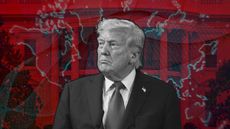Economy
The latest news, updates and features on the UK economy, the impact of what's happening in the US economy and other economic stories from around the world. Expert analysis and opinion from MoneyWeek.
Explore Economy
-

Did UK inflation fall in January?
After rising in December, analysts expect the next round of UK inflation data to show that disinflation returned in January
By Dan McEvoy Published
-

ONS: UK economy grew by ‘lacklustre’ 0.1% in final quarter of 2025
The construction sector performed its worst in more than four years in the final quarter of 2025, the latest Office for National Statistics (ONS) GDP figures show
By Sam Walker Last updated
-

Making Tax Digital: what is it and who does it affect?
Sole traders and landlords will have to start reporting their earnings digitally on a quarterly basis to HMRC from this April – here is what you need to know
By Laura Miller Last updated
-

What is Donald Trump’s net worth?
Donald Trump’s net worth makes him the richest-ever US president, and the only billionaire to live in the White House. We take a deep dive into his fortunes
By Oojal Dhanjal Last updated
-

Will UK interest rates fall in 2026? Latest Bank of England predictions
The Bank of England held interest rates at 3.75% in their February meeting. Will interest rates stay at this level, or will they fall further this year?
By Daniel Hilton Last updated
-

When is the next Bank of England base rate meeting?
The Bank of England held interest rates at 3.75% in February 2026. When is the next Monetary Policy Committee meeting and will interest rates fall further this year?
By Daniel Hilton Last updated
-

"Botched" Brexit: Should Britain rejoin the EU?
Brexit did not go perfectly nor disastrously. It’s not worth continuing the fight over the issue, says Julian Jessop
By Julian Jessop Published
-

'AI will change our world in more ways than we can imagine'
Interview Rob Arnott of Research Affiliates talks to Andrew Van Sickle about the AI bubble, the impact of tariffs on inflation and the outlook for gold and China
By Andrew Van Sickle Published
Interview -

Tony Blair's terrible legacy sees Britain still suffering
Opinion Max King highlights ten ways in which Tony Blair's government sowed the seeds of Britain’s subsequent poor performance and many of its current problems
By Max King Published
Opinion
